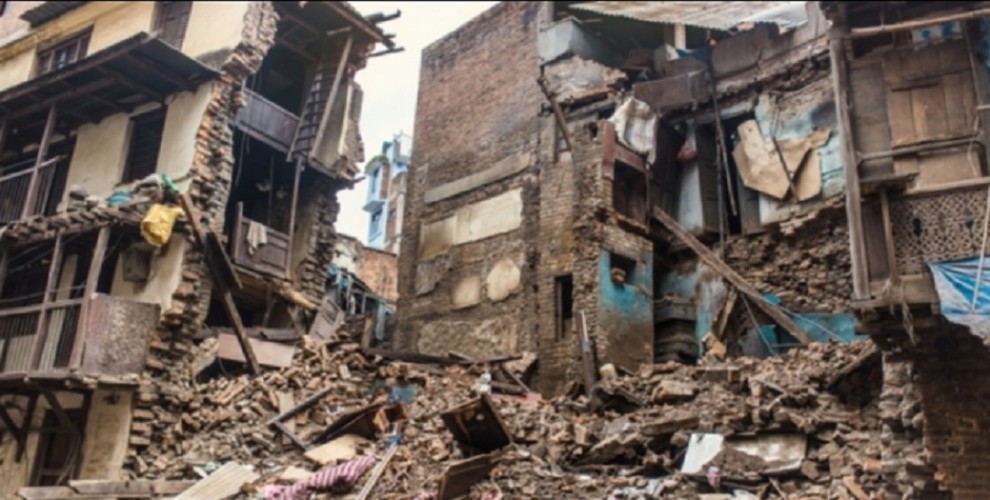Van, seven years after the earthquake
Seven years have passed since the earthquake that killed 644 people in Van.
Seven years have passed since the earthquake that killed 644 people in Van.

After the earthquake, people had to cope not only with the destruction brought about by the quake but became a victim of the construction sector.
Seven years after what was one of the biggest earthquakes in Kurdistan, the effects of that tragedy are still visible.
As it may be remembered, the epicentre of the earthquake, which took place on 23 October 2011 at 13.44, was in the village of Tabanli, 17 kilometres away from Van. The quake lasted 25 seconds. An eternity, enough to bring destruction and death.
The magnitude of the earthquake was announced by the Kandilli Observatory as 6.6 on the Richter scale and 7.2 according to the US Geological Survey Authority. In the statement made later that day by the Kandilli Observatory, it was stated that the earthquake intensity was 9 at the epicentre and the magnitude was corrected to 7.2.
644 people have lost their life and five thousand people were wounded
According to official figures as a result of the earthquakes on 23 October and 9 November, 644 people lost their lives and nearly 5 thousand people were injured. The number of houses destroyed was around 2,500.
The number of damaged homes reached 40 thousand. (In the investigations made after the earthquake, 72 thousand 242 buildings, dwelling, workplaces and barns were found to be destroyed or severely damaged.)
Difficulties experienced in these 2 major earthquakes and grievances are still not resolved. The description of the earthquake, the term they used, "the grace of God" is a proof of the immoral approach of the AKP government.
After the earthquake, the state bureaucracy of the AKP and the Palace, which turned this situation into an opportunity to overturn the sociology of the city instead of healing the wounds of Van, did not only make tens of thousands of people victimized, but left them face to face with more difficult conditions than the earthquake.
Erdoğan showed the BDP and Van Municipality as targets
Van Municipality and its co-chair, Bekir Kaya, mobilized all their forces after the earthquake yet were not included in the Earthquake Coordination Group where the Governor, District Governor, security and military authorities were located. The Prime Minister of the period Recep Tayyip Erdoğan went one step further, targeting the BDP and the municipality openly.
The earthquake in Van coincided with a cold period and the harsh winter conditions made the struggle for life even more difficult. Homeless people began to live under the nylons without heating.
Had the people not have their own internal solidarity and mobilization, the death rates would be much higher. For the elderly, children, patients, this process was much more difficult. People started to stay in tents.
International Aid refused
After the earthquake and the resulting inevitable human tragedy, the international community immediately reacted. After the news of earthquakes the world stood up and international organizations from the European Union, the United Nations and NATO as well as states from Germany, to the United States, Azerbaijan, Bosnia and Herzegovina, Armenia, France, Iraq, Israel, Kosovo, Northern Cyprus, Egypt, Pakistan, Russia, Greece, the UK, Poland, Hungary and Switzerland as well as sent messages of condolences, in most cases also offered help if requested.
However, Abdullah Gül, the then President of the Republic, rejected the offers by saying that Turkish teams had a sufficient capacity in dealing with such a disaster!
On 23 October, the Ministry of Foreign Affairs announced that all aid offers except those coming from Azerbaijan, Bulgaria and Iran, were rejected. Erdoğan, the Prime Minister of the time, (who had said: “We want to see our own strength after this earthquake”) delayed everything, avoiding in fact to intervene in a timely manner.
TOKI did not recognised the region as a disaster region
One of the most important effects of the earthquake was social life. TOKI seized the opportunity to ‘rebuild’ the area affected and in fact condemned people to even worse life conditions.
TOKI provided unhealthy living spaces finally forcing thousands of families to migrate to other provinces.
The State, not content with persecuting people already badly affected by the earthquake, waged a special war against the Van Municipality governed by the BDP.
Van and its surroundings had to be declared disaster area, yet it was not, intentionally.
In Van and its districts, which turned out to be an opportunity for TOKİ, some houses were built quickly. The houses were poorly built and in fact traded struck when a kitchen cupboard fell on 27 December 2013 in Ercis, and little Tuana Güngör, 5 months old, lost her life.
These houses were given to the victims in return for high rents, and people were pressured to remain in these homes.
Another example of opportunism and use of a tragedy for profit by TOKİ was the construction of uncontrolled buildings. In particular, the work carried out under the name of urban transformation brought nothing but harm.
Another impact was on the local economy. The economic destruction of the earthquake was high. “The economy will revive in Van”, said the AKP, promising loans, projects, while not fulfilling any of those.
Most of the trades closed the shutters in this process. This situation was felt the most in Ercis. Only in the first three years up to 250 records of trades has been removed from the Chamber of Trade and Industry.
While small businesses closed down, big businesses grew. And it was not a coincidence. Shop chains such as BİM and A 101, opened and their numbers increased rapidly in the district.
In summary, Van, after the earthquake had certainly lived a change / transformation. But this change was carried out for political gains and after 7 years, the area’s wounds are still open and bleeding.